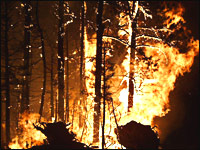Earlier this month, Harvard psychologist Daniel Gilbert delivered a provocative Los Angeles Times op-ed explaining why the public is more scared of terrorism than global warming. Gilbert’s basic premise was that human beings are conditioned by evolution to react most strongly to situations that have certain characteristics: they must be personal (have a face or an intention attached), morally repugnant, imminent, or rapid. Terrorism, he said, fulfills all of these requirements; climate change, on the other hand, fulfills none. Thus, while we focus on combating ideological hoodlums around the world, we fail to respond to an even greater global peril.

It burns, burns, burns.
Photo: NWS.
Evidence suggests that global warming is more imminent and rapid than most people think. But it may take a literal fire — the kind now blazing through California, Montana, New Mexico, Arizona, Idaho, and Wyoming — to light a fire under us. As I write this, the Sawtooth complex fire has just merged with the Millard complex, about 20 miles east of California’s Big Bear Lake. Together they have charred about 61,000 acres so far and forced hundreds to evacuate their homes; the weather forecast, meanwhile, calls for “little relief” in the next few days, in the form of 100-degree-plus temperatures.
These forest and grass fires, according to a paper published this month in Science, are on the upswing due to global warming.
Reviewing some 1,166 wildfires between 1970 and 2003, the researchers found that today’s fire season is about two and a half months longer than in the 1970-1986 period. Rapid snowmelt due to warm springs and early summers dries out the landscape earlier, they said, creating giant tinderboxes ripe for ignition. Adding to the effect is the rise in bark-beetle outbreaks through much of North America. Bark beetles naturally have a two-year life cycle, but warmer temperatures allow them to complete their cycle in one year. Dead trees left in the wake of the beetles’ rampage make for superb fuel, whether sparked by summer lightning or a carelessly tossed match.
Forest fires, some may say, are one of those natural events people in the West must endure — just as those who live in New England must grow accustomed to the occasional blizzard. After all, as long as humans have roamed the earth, they’ve had to deal with the capricious effects of weather. And humans are remarkably adaptive. One group of San Diego residents has preempted Mother Nature by investing in a herd of goats that will, over the next few weeks, munch through all of the flammable underbrush around their homes. The Dutch, too — famous for their unmatched network of canals, dikes, and pumps that keeps the North Sea at bay — are responding to impending climate change in a surprising fashion, allowing selected farmland to reflood in order to protect more densely populated regions from a watery fate. The logic is grim but practical: better a small sacrifice now than a huge one later.
Yes, we can adjust and avoid to some extent. But climate models predict that rising ocean levels will eventually swallow the world’s coastal cities — where some 1.2 billion people now live. As masses migrate inland, the population density will skyrocket on increasingly arid land. Not exactly a recipe for peaceful coexistence.

Got fuel?
Photo: iStockphoto.
In my more cynical moods, I think this is actually the way it was meant to be. What better way for the earth to cleanse itself than to get rid of its most egregious polluters? The planetary balance will be restored, with or without mankind to witness the process.
Normally, however, I am more optimistic. And recently, I’ve sensed a warming trend in favor of major environmental action. Besides Al Gore’s much-hyped documentary An Inconvenient Truth, the past few months have seen a torrent of books, magazine articles, and television programs devoted to the subject. In June, Rep. Henry Waxman (D) of California and 12 of his colleagues introduced the Safe Climate Act, the most progressive piece of anti-global warming legislation thus far (though Waxman himself admitted that it would take a shift in the congressional climate to bring the bill to the floor). Meanwhile, others are working to recast global warming as a non-partisan issue, with evangelical Christians and military hawks joining forces with traditional activists to fight a common enemy.
So yes, I have hope. Hope that the ambient energy will translate into tangible results — emissions caps, cleaner cars, renewable energy, and better mass transit. Hope that money for research and development in all of these areas will be easier to come by when we stop subsidizing the fossil-fuel industry. Hope that despite the current administration’s disdain for science, the facts will soon force a greener agenda.
Or, I should say, I am half hopeful. The other half of me is the Dutch side: the skeptical pragmatist who keeps an eye on the rising mercury and encroaching flames, and wonders where I might get my hands on a sturdy bunch of goats.



